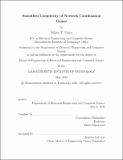Smoothed Complexity of Network Coordination Games
Author(s)
Viera, Julian T.
DownloadThesis PDF (347.7Kb)
Advisor
Daskalakis, Constantinos
Terms of use
Metadata
Show full item recordAbstract
The problem of finding or computing Nash equilibria has been an important problem in economics and computer science for decades. Classical worst-case and expectedcase analyses have shown that in many cases for many types of games, computing Nash equilibria is intractable. However, it has been empirically shown that in many instances, approximate Nash equilibria can be computed efficiently. Thus, there is a growing interest in the smoothed complexity of games. That is, the complexity of computing Nash equilibria when the inputs to the problem are confined to look more like real-world inputs. This thesis provides a further analysis of the smoothed complexity of network coordination games. We specifically look at the smoothed complexity of the 2-Flip algorithm. While we do not prove that using the 2-Flip algorithm on 2-Flip-Max-Cut achieves smoothed quasipolynomial time, we discuss multiple attempts at this goal, and hope to provide other researchers with the inspiration to prove quasipolynomial time.
Date issued
2022-05Department
Massachusetts Institute of Technology. Department of Electrical Engineering and Computer SciencePublisher
Massachusetts Institute of Technology